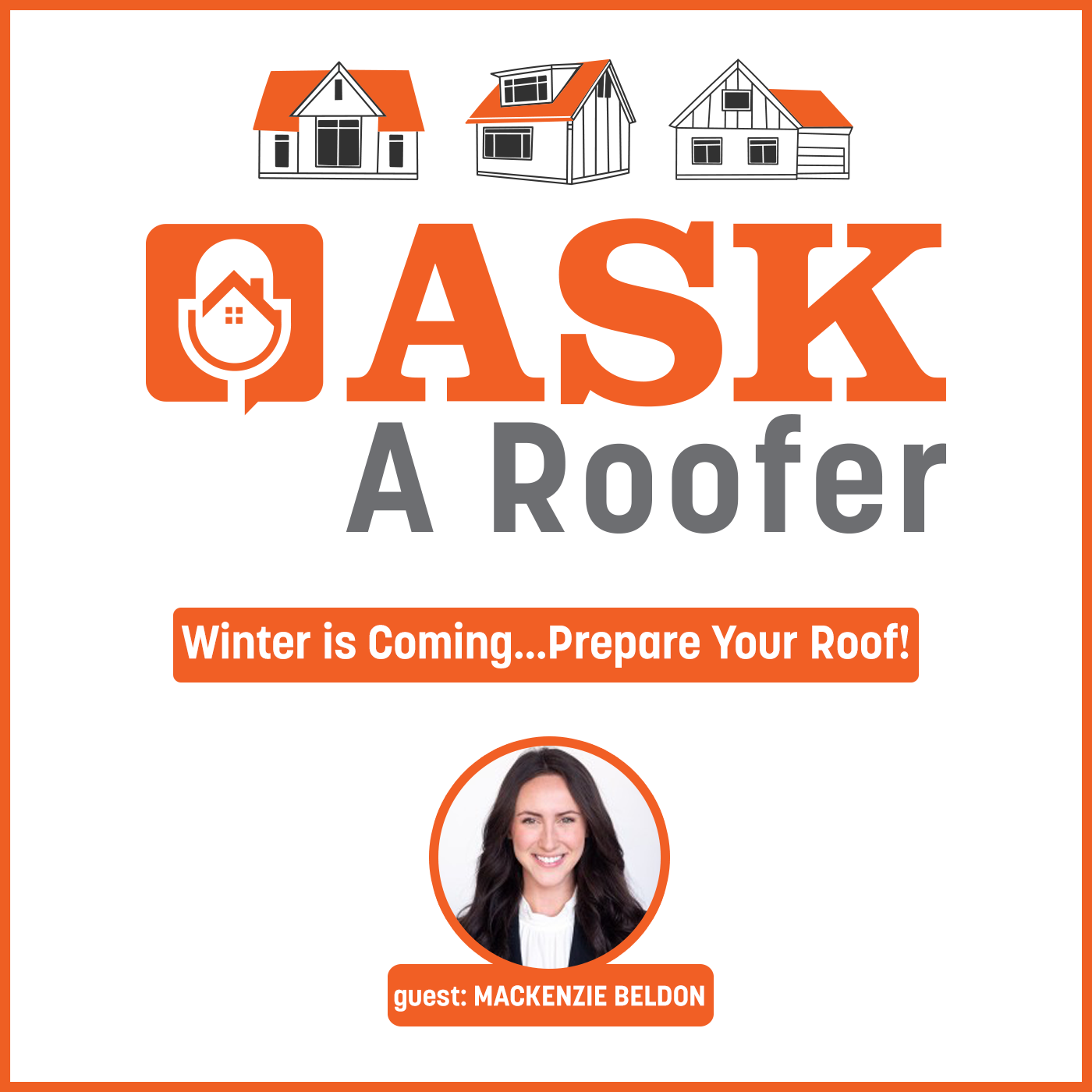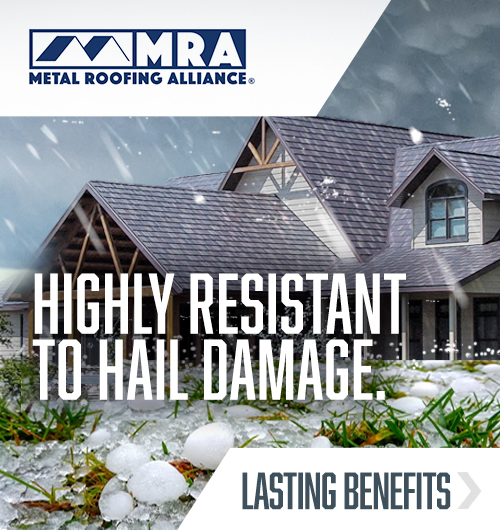Winter is Coming...Prepare Your Roof! - PODCAST TRANSCRIPTION

Editor's note: The following is the transcript of an live interview with Mackenzie Beldon. You can read the interview below or listen to the podcast.
Alice Reynolds:
Welcome to the AskARoofer Podcast, a podcast for people with roofs. My name is Alice Reynolds. I'm a new homeowner.
Megan Ellsworth:
And my name is Megan Ellsworth, a roofing enthusiast, and we are with RoofersCoffeeShop.
Alice Reynolds:
We want to share the knowledge of the contractors we work with every day with home and building owners.
Megan Ellsworth:
So please join us as we talk with industry experts, roofing contractors, business owners, and more to answer all of your burning questions about the health and maintenance of your roof.
Hello, my name is Megan Ellsworth here at askaroofer.com. I was going to say rooferscoffeeshop.com, but that also counts. I am your co-host for today's AskARoofer podcast, and I'm joined today by...
Lauren White:
Lauren White. I'm with all of the sites.
Megan Ellsworth:
All of the sites. Yes, we are with all the sites. Really excited to be interviewing MacKenzie Beldon today from Beldon Roofing. Hi, Mackenzie. How you doing?
MacKenzie Beldon:
Hi, I'm doing well. Thank y'all for having me.
Megan Ellsworth:
Absolutely. Thank you for joining us. I'm really excited to talk about this topic. Winter is coming. I mean, I prefer fall personally, but winter's cool too. So let's just have you introduce yourself. Tell us a little bit about your backstory and Beldon, and then we'll get started with the real questions.
MacKenzie Beldon:
Sure. So I'm MacKenzie Beldon. I'm fourth generation at Beldon Roofing Company. I handle our business development across Texas, and then in addition to that, I also handle our preventative maintenance operations, and that's called Roof Extend, so that's something I've tackled in the past few years. So that's a little bit about me, and I'm really excited to be here with y'all. It's an honor for me to be helping people prepare the roofs for winter. This is not something I ever thought I'd have to help people with in Texas, but given my past three years in the DFW area, we have had a lot of preparation, and now this is actually something that we need to teach our customers.
Lauren White:
Well, we're very excited to have you, and I guess we'll just jump right in. This year, meteorologists are predicting that winter is going to be especially harsh, maybe again. So how can homeowners and building owners prepare their roofs for these extreme temperatures that maybe they're not used to?
MacKenzie Beldon:
So some of the things that we would recommend are trimming the trees around your house. This is a good time to take care of your roof line, so trimming any trees on the perimeter. If you experience any snow or ice build up during that time, we also recommend putting an anti icing product on the roof line. You can think about that. Before going into the winter, you want to inspect and clean your gutters, check your roof flashings, and inspect the edges as well as examine your shingles, so really just understanding the state of your roof before going into the winter seasons where we are expecting to have snow and ice. So as far as the anti icing products, you can talk to your roofing contractor and see which one they recommend for the region that you're in.
Lauren White:
Perfect.
Megan Ellsworth:
Fabulous. That's great advice. So what are some first steps homeowners should take after a winter storm hits? Once the coast is cleared, they can get out of the house, what should they look for?
MacKenzie Beldon:
So if your area where your home is was hit by a strong storm, a strong winter storm, and you think that there's any potential that you have roof damage, you should contact your insurance company first. They'll know the relevant information. They'll know whether or not your roof was in an area that was impacted significantly, and they can best determine what happens next, whether it's engaging a contractor or meeting with your adjuster first. But that's our first recommended step. And then usually, when you're working with Beldon, we'll meet you with your adjuster at that point, but some insurance companies operate differently, so you'd want to check with them first.
Lauren White:
All right. That's great advice. And don't they usually recommend taking pictures too, of any damage, just to have?
MacKenzie Beldon:
Yes. Anything that you could take pictures of. Of course, during a winter storm, if there's ice or snow, we don't recommend that you go on your roof, so if it's anything that you can see from the ground or something that you can snap a picture of from a window or a relatively safe area, please do. But if you believe or suspect that there's damage, it's better to have your adjuster or roofing contractor safely document it.
Lauren White:
Yes, definitely want the professionals on the roof, not home and building owners.
MacKenzie Beldon:
Unless you have a drone and you can fly it, which in that case, you might have a business for the whole neighborhood at that point.
Megan Ellsworth:
Yeah. Wow.
Lauren White:
So I guess one of the things that maybe people can see is ice damming, so how can home and building owners prepare their gutters to avoid ice dams, and maybe if you can explain what an ice dam, it's self explanatory, but what that means on top of a roof?
MacKenzie Beldon:
So an ice dam is actually when you have a buildup of ice in your gutters and it stops the water from correctly flowing through off of your roof and can cause it to pool and actually refreeze in larger chunks of ice, and while it might seem harmless, it can actually cause some serious damage. So going into the winter season, what we recommend is cleaning your gutters ahead of time, removing dead leaves and any debris that you can. If possible, you can add fiberglass insulation or a blanket or heat strips to stop the ice from actually building up before it begins doing so, and also you could consider upgrading your gutters to something with a gutter guard or a helmet to help reduce icy occurrences. But really starting off with cleaning the gutters before we go into the season will be your best bet.
Megan Ellsworth:
Absolutely. What are some signs of damage that owners should look for in the winter on the roof or the gutters? Maybe they don't know that there's an ice dam forming. How do they see that or look for it?
MacKenzie Beldon:
So looking for signs of damage from the winter. After the season or after the snow or ice melts, you'd want to definitely look for missing or cracked shingles. Anything you could see from the ground level or have a roofing contractor come out after the storm. Water leaks, like you were mentioning, you had water coming into your room. Anything into the home or the attic, we definitely want to inspect and look at and make sure that there was no damage on the roof. Any fallen tree branches during that time would be something that could be indicative of potential damage to something that we would want to look at as well. Loss of granules, they could be on your driveway, you might see them, which is also a concern for your roof at that point. Broken gutters and then water pooling in any specific areas would also be something that we would be concerned about from a roofing standpoint point.
Megan Ellsworth:
Cool. Follow up question. When should a homeowner, when do they call you? When do they call a contractor? When they see those broken shingles and the granules and all those things?
MacKenzie Beldon:
Absolutely. So if you see granules on your driveway, that could be deterioration of your roof. That's obviously for concern, so contact your local roofing contractor. That could be something that is beyond a winter storm, so it could be not necessarily something that you would notice. It could be after the winter season and you're starting to notice it as that snow and ice melt, so at that point you could engage a roofing contractor to come and inspect your roof and really give you an idea of if there's any significant damage that you need to address.
Megan Ellsworth:
Awesome. And then I actually thought of another follow up question. So I've heard a lot of people during the holiday season nailing Christmas lights into their roof. What are your thoughts on that?
MacKenzie Beldon:
I'm going to say you should never nail anything into your roof. Don't get on your roof unless you're a roofing contractor and you're tied off.
Megan Ellsworth:
Yes. That is the note to take from this podcast.
MacKenzie Beldon:
Yes. Okay. The key takeaway. You should never nail, staple, or puncture your roof to hang lights. Please don't do that. And please don't be on your roof doing that and not tied off. If you want to hire a professional and tie yourself off, safety is the number one priority. But also definitely nailing and puncturing your roof in any way is something that we would be concerned about from a roofing standpoint, and it can cause some permanent damage to your roof.
Megan Ellsworth:
Mm-hmm. Thank you.
MacKenzie Beldon:
Of course. I'd never thought about that before.
Megan Ellsworth:
I know. I just thought why not?
MacKenzie Beldon:
I mean, not only is it's so dangerous, but it's not good for your roof. I mean, if you want to replace your roof every few years, but I don't think Santa's covered by insurance.
Megan Ellsworth:
It was Santa's fault.
MacKenzie Beldon:
I don't have the Santa policy on my house, so we definitely don't hang anything here. A wreath on the front door. That's about it.
Megan Ellsworth:
Yeah. No Clark Griswold's over here.
MacKenzie Beldon:
Keep it in the yard if you can. My best recommendation for preventing any damage to your roof at the winter storm would be not putting anything on your roof that you can prevent from putting on your roof.
Lauren White:
Wonderful. Let's see. I guess, yeah, just any other tips that you can think of just from the roofing aspect of things that home and building owners can use to prepare now for the upcoming winter months? What are your thoughts?
MacKenzie Beldon:
Yeah, absolutely. I mean, inspect your gutters, inspect your roof. Look now. Contact a contractor if you think you have issues now, and have them come out pre-winter to help do any repairs, or help prevent any further damage if you do have any damage going into the winter months. Additionally, roofing contractors, and I'm speaking as one, and I think I'm speaking for all of us, but I'm going to make a general blanket statement and say that we want to help you protect your roof. Extending the life of your roof is our number one priority. We obviously want to keep water out of your house and make sure that you have a great holiday season, so if there's any cause for concern or you think you're experiencing roofing issues, call a roofing contractor in your area. There are tons that are willing to help, and they'll happily come and inspect your roof and just give you peace of mind, whether it be going into the winter months or whether it be after a storm and you're needing assistance. Don't be afraid to reach out. I'm always happy to help as well in any way.
I am in Texas, but I can connect you to anybody across the nation. We have a lot of peers.
Megan Ellsworth:
Yeah. And thank you so much speaking on all this with the fact that you're from Texas. You're so knowledgeable. Thank you.
MacKenzie Beldon:
Hey, I have to learn this now. This is my climate. We just go from hot, hot, hot, and then we have freezes. So now it's like...
Megan Ellsworth:
Awesome. Well, thank you so much, Mackenzie. This has been a blast.
MacKenzie Beldon:
Of course.
Lauren White:
Yes, thank you.
Megan Ellsworth:
And we will be chatting with you maybe another time.
MacKenzie Beldon:
Oh, I always love getting to chat with you, Megan. And thank you so much, Lauren. It was great to see you all.









Comments
Leave a Reply
Have an account? Login to leave a comment!
Sign In